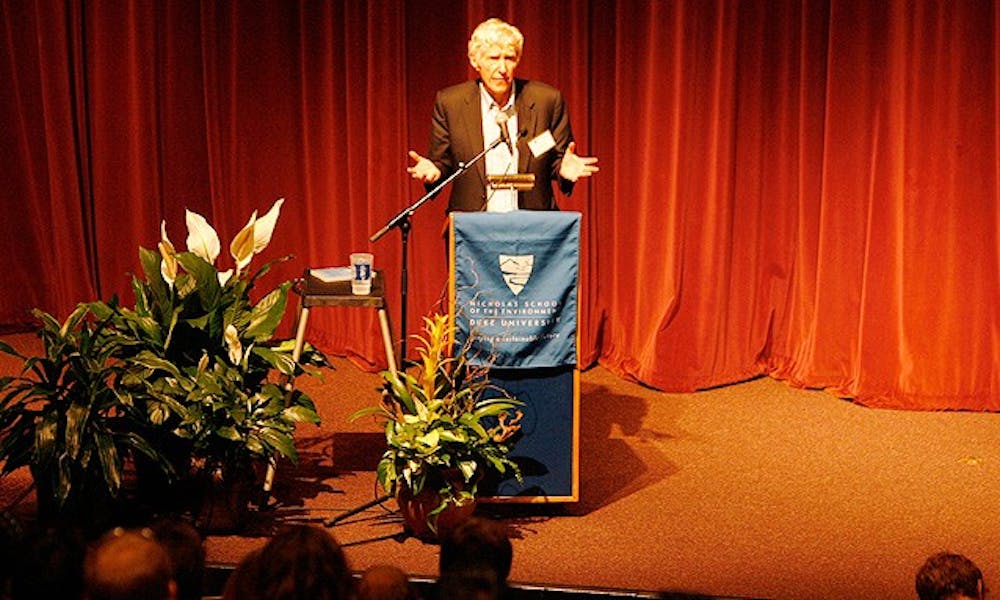The Duke community was given a chilling reminder of what could happen if governments do not mobilize to stop global warming.
Environmental economist Lester Brown delivered this message as the keynote speaker for the 15th anniversary celebration of the Stanback Fellowship Program, which supports Duke students in environmental jobs across the country. Brown discussed the threat that global warming poses and the need for a new approach to economics that reflects the realities of limited resources.
“No civilization has ever survived the destruction of its natural support systems, nor will ours,” Brown said.
Brown, who founded the Earth Policy Institute and has written or co-written more than 50 environmental policy books, differentiated between the scientific community’s world view, which recognizes the need to change our treatment of the environment, and the economists’ outlook, which projects continuous growth for years to come. He noted that in some projections the economy will double within a few decades and criticized economists’ tendency to overlook natural limitations on growth.
“It’s certainly nice being an economist because they never ask the difficult questions like, how much water will it take to double the world economy and where will that water come from?” Brown said. “Or, how much food will be needed to satisfy demand in a world where the economy is twice as big as it is today?”
Brown argued that humankind will be forced to come to terms with the unsustainability of continued economic growth sooner or later, although nobody knows exactly when. He said the key to the coming breakdown lies in global warming’s threat to food security. Increases in global population and general affluence create more demand for food, even as governments divert grain for ethanol production.
Meanwhile, several trends limit food supplies. Rising temperatures reduce agricultural productivity, falling water tables limit the amount of water available for consumption and farming and soil erosion eliminates available farmland. And, Brown said, farmers have caught up with scientists—technology no longer continues to increase agricultural productivity. A global food crisis would threaten the stability of governments, leading to more failed states.
Brown recommended cutting carbon emissions 80 percent by 2020, stabilizing the world population at eight billion people, eradicating poverty and restoring the environmental systems that support our economies.
He also called for the economy to reflect the hidden costs of human actions. For example, the price tag of gasoline reflects its production costs but does not include the indirect costs of climate change, respiratory illnesses from polluted air and the American military establishment protecting access to oil in the Middle East. He likened this situation to Enron, which projected an image of great profits by keeping costs off the books.
Brown argued for lowering the income tax and raising a carbon tax to reflect these costs. He said this would not increase overall taxes on each person, but would employ market forces to push down carbon emissions. He discussed the need for technological increases in efficiency and cited the American industrial effort in World War II as a paradigm for a massive technological response to the threat of global warming.
After the speech, Bill Chameides, dean of the Nicholas School of the Environment, presented Brown with a painted ceramic depiction of a caterpillar approaching the end of a branch. Chameides likened the caterpillar’s predicament to humanity’s position in the face of global warming—it will either fall or metamorphose into a butterfly and fly away.
“It’s not the most uplifting, optimistic talk,” Chameides said in an interview after the event. “It’s certainly sobering and gives us a lot of thought about how we need to move forward in the future.”
Chameides noted that although Brown’s background is not in environmental science, he draws information from the scientific community. He added that Brown’s goals for carbon emission reductions and limiting the population are challenging but conceivable.
“I don’t think eight billion’s impossible—I think it’s going to be tough,” Chameides said. “I think it’s a little optimistic. I’m hoping for nine.”
Roberto Jimenez, a second-year graduate student at the Nicholas School, appreciated Brown’s food-centric approach to global warming advocacy.
“There are a few people out there that are really putting these big global problems in the context of food security and that’s something that people can hold on to, understand, get alarmed about and take action about,” Jimenez said.
Get The Chronicle straight to your inbox
Signup for our weekly newsletter. Cancel at any time.

